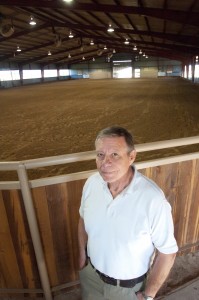Although Jerome Pagel would eventually end his business relationship with the couple, he was one of those who became lifelong friends with Ernest and Margaret. Their popularity with others in Muenster increased as the local guest list for their parties grew.
“There wasn’t a tuxedo owned in the whole community before they came,” John said. But if you wanted to go to the Medders parties, “You had to dress the part. So there were a lot of people who went out and bought tuxedos so they could make the parties.

“I think everybody thought they were kind of hillbilly country bumpkins, you know,” he said. “But they could put up with that” in return for the good times.
The good times extended far beyond the parties. The Medderses were a boon to many local businesses and workers. Although she became a favorite customer at Neiman Marcus in Dallas, Margaret also shopped for clothes in Muenster’s best stores. There was liquor and food and livestock feed to buy. Plus, the couple hired honest-to-God cowboys to help them in their ranching enterprise. And ironically, they also drilled 18 oil and gas wells on their 1,200 acres, so roughnecks were in demand. The money spread all across town.
John said that, in addition to the roles of friend and builder, his father also occasionally acted as chauffeur to the quirky couple. Jerome drove the Medderses to places like Mexico City for a visit to the Basilica de Guadalupe, on a trip out west, and even to Mishawaka, Ind.
That last one wasn’t a pleasure trip. Ernest and Margaret were having trouble paying the bill for his construction work — one of the first signs that things weren’t quite what they seemed.
“Sometimes Medders wouldn’t have the check,” John said. “And my dad would say, ‘Well, let’s go get in the car and go get it.’ And I think there was a time or two when there was a question about whether or not there was going to be any more money. And I think that was one of the occasions when they went back up to Indiana to assure [the nuns] that the [oil] money” was on its way.
Jerome also had major disagreements with the couple from time to time. Margaret “was just pushy,” John said. “She would demand something, and [Jerome] would tell her no. They would sit across the table and cuss each other like two dogs.
“She was set in her ways,” the younger Pagel said. “She would say, “I’ve got money, and I want to have it my way.’ And Dad would say, ‘No, you can’t have that. You can’t do it like that, and we’re going to do it the right way.’ Or, at least, his way.
“Margaret was pretty demanding. But she met her match when she met Jerome Pagel.”
His father even kicked Ernest and Margaret out of their own car once, on a trip to Fort Worth.
“He made them walk,” John said, still chuckling over the memory. “I don’t know how they got home. They had gotten into it over some detail about the house. He said, ‘All right, if you don’t like what’s going on, just get out.’ And they got out.
“But that was their relationship. It was sort of like a marriage, so to speak. You fuss. You fight. You get back together.”
John Pagel is one of those who remains convinced that the Medderses were legitimate heirs to the Spindletop money — or, at worst, that they believed they were.
“They had the nuns convinced that the money had been set aside in escrow accounts until the proper division orders had been placed,” John said. “They may have had a legitimate claim. Either that or they were duped by some attorneys who convinced them that that money was theirs.”
A devout Catholic, John Pagel also places some of the blame for the debacle on the Poor Sister themselves.
“They were showing as much greed as everybody else around here was,” he said. “And if I could get $10 million for a [$2 million] loan, I’d think about it too.”
********
For 32 years, Rufus Henscheid ran the Muenster Building Center, and when the Medderses stopped doing business with Jerome Pagel, they turned to Henscheid. A tall, muscular man with red hair, Henscheid looks like he knows his way around a two-by-four. Both he and his wife Betty, a small attractive brunette, could pass for 15 years younger than their 80ish ages.
They knew Ernest and Margaret professionally and socially and at Sacred Heart. But Rufus takes a darker view of the couple than John Pagel does.
Like Pagel, they found Margaret’s overbearing ways and the couple’s wasteful lifestyle, with its ice sculptures and lime trees, hard to take.
But what most bugged Rufus, as well as some of his Republican friends, was the couple’s liberal politics. Ernest and Margaret were Democrats; they wore their politics on their sleeve and gave large sums of money to the Democratic Party.
They attended White House dinners and were even escorted to one function by Secretary of State Dean Rusk. They flew on Air Force One. A star-struck Ernest had a trophy case full of Democratic Party mementos, including a pair of cufflinks given to him by LBJ.
Additionally, like many in the Democratic Party, the Medderses were backers of the civil rights movement that was spreading through the United States in the early 1960s. Indeed, they were the first people in Muenster to hire blacks for their household staff, a fact that did not go over well in an almost completely white town. Even today, blacks hardly register in demographic breakdowns of Muenster’s population.
The Medderses’ efforts to desegregate the city were met with resistance. Signs including the “N” word popped up in their front yard overnight. And each morning Margaret would march defiantly out into the yard and pull them up.
That defiance and the Democratic leanings particularly irked the late A.V. Grant, an attorney and staunch Republican.












Great article Steve. I worked with a district Alabama Judge in the private sector on up-dating the heirship claim to The Estate of Pelham Humphries from 1986 until the time of his sudden illness and death in August of 1993. The old judge, as an attorney, had taken over the claim after W. T. Weir whom everyone in my family knew as ‘Old Barefoot’ because he sat in his wheelchair in his sock feet to practice law. The old judge always stated in private and in public that the KEY to Ernest and Margaret Medders being able to draw that money from The Catholic church was for two reasons. First, Margaret found out about the money coming to St. Josephs from the Spindletop accounts while she was snooping around on the night shift at St. Josephs in Memphis. Second, Ernest knew all about the claim through his first marriage prior to his marriage to Margaret. Do you know anything about Ernest’s first marriage? I knew about the newspaper article that originated in Tuscaloosa, Alabama. I was told that the lawyer behind that took in alot of money and moved to South America??? I wrote two books about Spindletop following the old judge’s untimely death.
He was planning on retiring from the bench and filing as administrator of The Pelham Humphries Mineral Estate. He stated this at many public meetings. Death prevented his dream. Up-date…there is a suit pending to be filed in Beaumont, Texas (May 21, 2012) styled Wayne Hodge vs. State of Texas, Commissioner of the Texas General Land Office and
the descendants of W. P. H. McFadden. This might be worth watching if it is litigated. My interest is that my ancestors were summoned by The President of The United States, William McKinely in July of 1901 as heirs of Pelham Humphries. We WON and were granted leave to amend per Case 512 CL90 in Jefferson, Texas (Marion County) in September of 1901. Something happened and the old judge told us that our case is still open in State Court. I have worked two jobs most of my life and assure you that, unlike Ernest and Margaret Medders, I have never received any money from Spindletop. Oh by the way, if the current case goes to court, there is a MEDDERS claim that will probably intervene. These folk contacted me recently as to any knowledge I have that would help them They seem to be nice people but are claiming under a one-eighth unrecorded drilling document.
Again, great article Steve. Sincerely, Jackie Carroll 205 410-5799
My grandmother was friends with Margaret Medders when they lived in the Hometown Subdivision south of Memphis. My mother and I went to visit them later when they were living in the housing project, Lauderdale Courts. I was impressed because that was where Elvis used to live, but they were pretty hard up because she was working as a nurse’s aide and even though Earnest was a mechanic, he had a bad back and wasn’t working. I was a teenager at the time, but my mother took them a few gifts for their kids because she knew their money was tight and they didn’t get many luxuries. I found it so amazing when I later heard about all that happened to them and their move to Texas.
Not that it matters, and I don’t know about Earnest, but I do know that Margaret was always a Catholic.
Oh how interesting. It’s so unusual for a very poor person to be so greedy & flamboyant.
Maybe I’ve just never known anyone that obtains such an opportunity. I remember it well when ther Medderes air castle burst. I am from Montague County & it was mesmerizing. Apparently Margaret Medders had no consicience. She had lots of gall!
I was told many years ago that a Medders drilled 1st well of Spindletop. That we was heirs and not received payout? My Grandmother was a Medders.
My late X husband was 5th generation from Pelam
Humphries. They never received a payout. It’s interesting history. My Great Grandmother was a Yates I also heard they were very wealthy from oil.
Love history. If you have any info on any of this
love to hear from you.